
River Oaks Baptist School lists “self-identification as a person of color” as a requirement for an open position; has preschool students compare their skin to the color of food
Incidents
In 2020, River Oaks Baptist School’s Head of School Leanne Reynolds wrote an article detailing the trials that the school and parents went through due to COVID-19. In this article, Leanne Reynolds quickly moves to discussing how her role as a “white woman” led to “oppressing people of color.” She explains in her article:
I didn’t plan, for example, to learn so much about my implicit role as a white woman in the systems oppressing people of color as we explored diversity, equity, and inclusion as an educational priority. Or how demoralizing the term “colorblind” is, dismissing the rich beauty of our differences. The learning and unlearning that has stemmed from this initiative has been eye-opening for me personally and game-changing for us as educators.
She continues to explain that students are “protesters of the future” and that it is the school’s “responsibility to keep learning for them.” She then explains that school leaders “participated in the People of Color Conference last winter and the Diversity Leadership Institute this summer.” She also admits that the school is changing its curricula to achieve “cultural competence and racial literacy.” She states: “It is why we have engaged a curriculum consultant to work with our academic leaders on lessons in cultural competence and racial literacy. It is why we will always keep asking, how can we do things better?” Similar to the phrase “culturally responsive,” the term “cultural competence” is also often used to describe a method of teaching that includes the race and ethnicity of students as part of the lessons taught in classrooms.
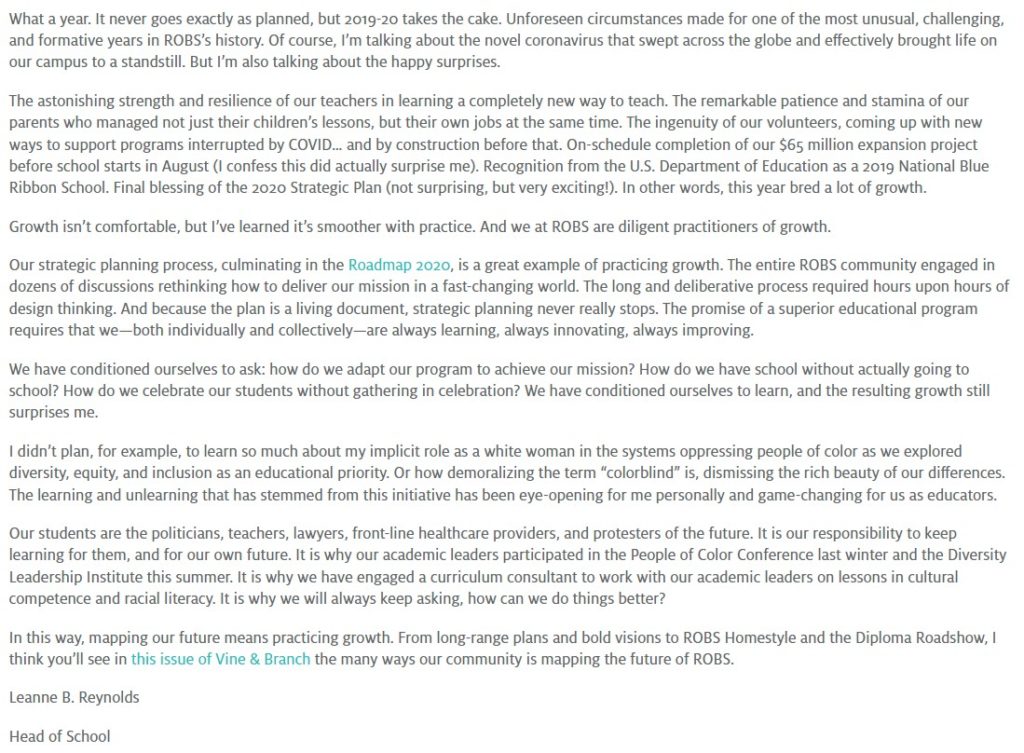
The Head of School had a link to the school’s “Roadmap 2020” document in her article. The document includes a section labeled “Diversity, Equity, and Inclusion.” The school’s roadmap states: “Only by ensuring equitable practices that value and support every student, parent, and employee can ROBS cultivate a community in which all can thrive.” The roadmap then lists “action steps” that guide the school to achieving “equity” and “diversity.” These action steps include changing the curricula to implement the ideas of equity and using race as a determining factor when hiring new faculty or accepting new students. The following are the school’s action steps:
- Actively work to recruit and retain families and faculty of color.
- Provide adult education and professional development in cultural competency.
- Promote teaching practices and curricula that reflect, engage, and enlighten all learners.
- Create programs that foster community connection and inclusivity, especially attentive to new school families and families of color.
- Formalize systems to restore connection with disenfranchised students and families.
- Examine ways to ease accessibility for families and employees who live in outlying areas.
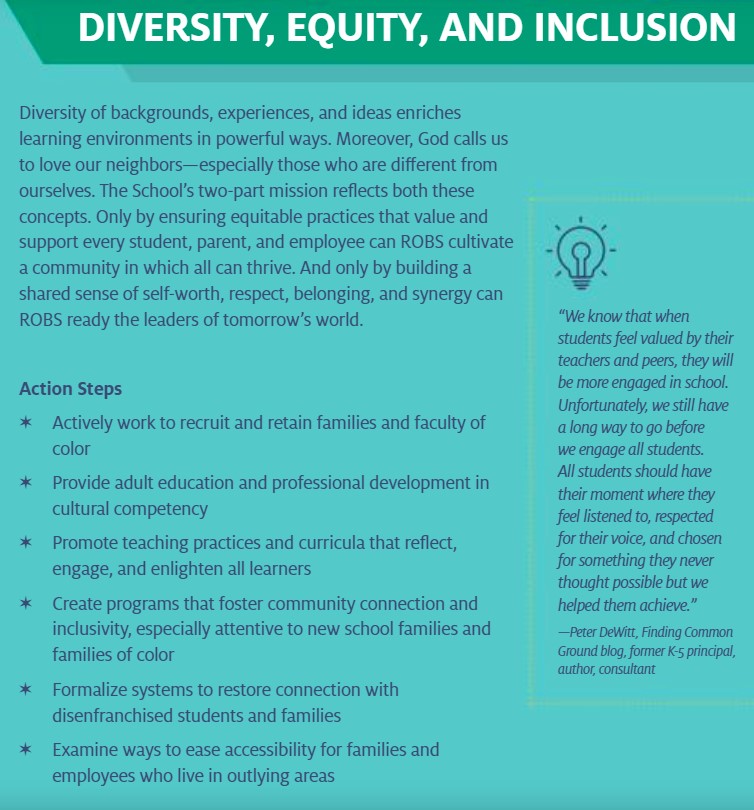
On the school’s “about” page, the school appears to place a focus on the race of students. The school states that 30 percent of students are “students of color” and that “representation matters.”
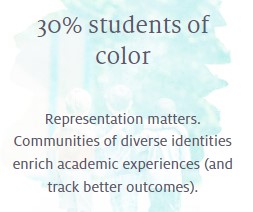
The school’s “about” page also has a “Diversity Mission Statement.” Despite being a private Christian school, the “Diversity Mission Statement” explains that “the River Oaks Baptist community acknowledges and respects the diversity that exists in our ethnic, cultural, and religious backgrounds, the languages we speak, the traditions we observe.” This statement also explains that the school is “actively teaching and advocating the appreciation and valuing of diversity throughout the School and community.”
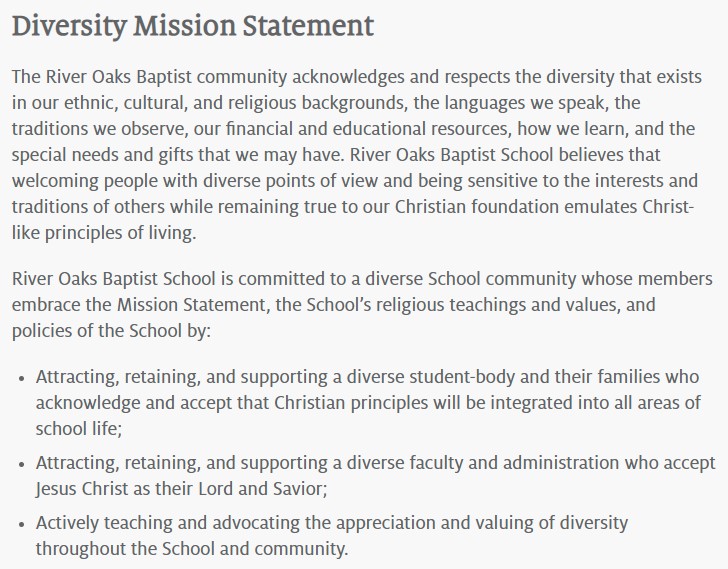
The school has the cost of tuition and fees for the 2022-2023 school year. This cost of tuition depending on the grade and level ranges from $20,305 to $30,425. The school also has a webpage explaining parents can apply for financial assistance. However, the school uses the financial assistance page to explain that this assistance “is designed to promote the development of a richly diverse student population that enhances the quality of a ROBS education.”
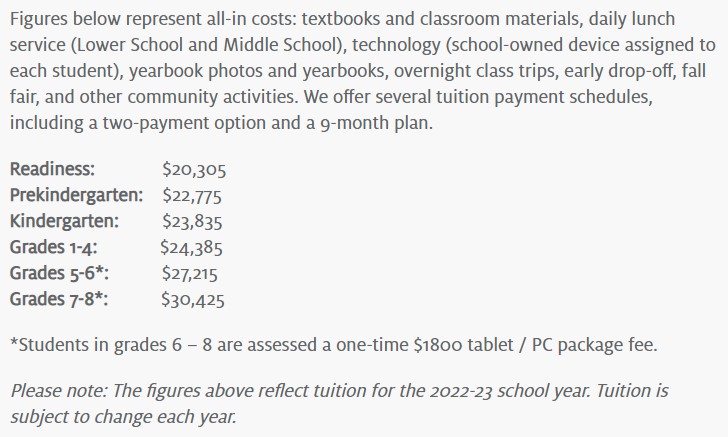

The school has several positions open online. A responsibility for the “lower school teacher,” “lower school assistant teacher,” and “middle school social studies teacher” is to “develop and practice cultural competence in teaching and teamwork.” The school also has a position open titled “lower school Hogan fellow” specifically for a “person of color.” The school states: “Thanks to a generous grant, Hogan Teaching Fellowships provide one year of classroom experience and mentoring to talented young educators of color.” A qualification for this position is specifically “self-identification as a person of color.” The school provides the following description of the job:
The Lower School Fellow will teach under the supervision of a mentor teacher. Depending on the teaching assignments, the Fellow will co-plan lessons with the lead teacher. The Lower School Fellow also will have the opportunity to co-teach and teach classes from time to time. The Lower School Fellow will work in various classrooms over the year to provide exposure to different age groups, teaching styles, and subjects.
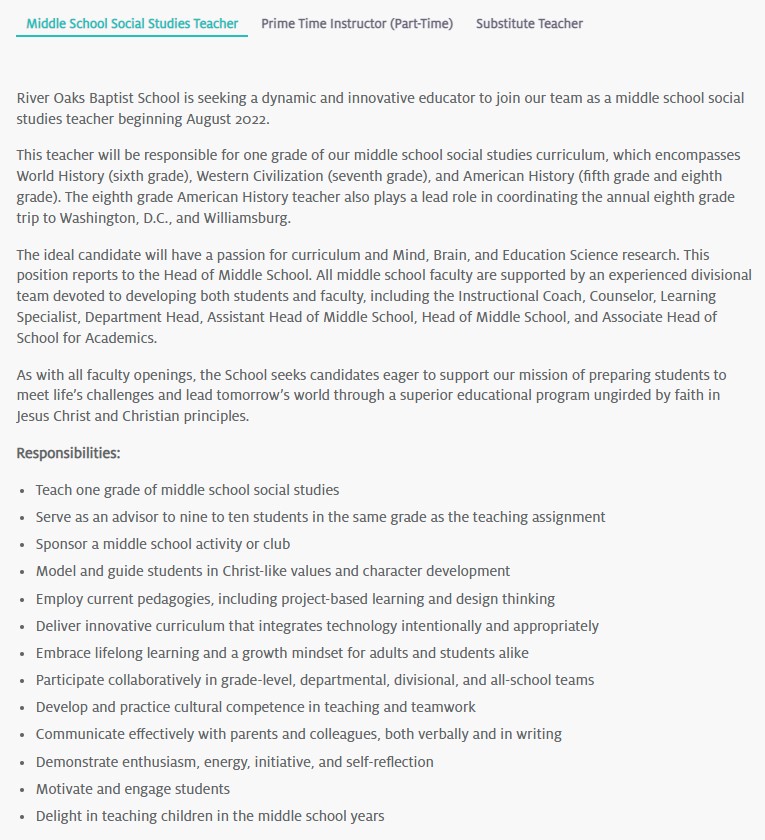
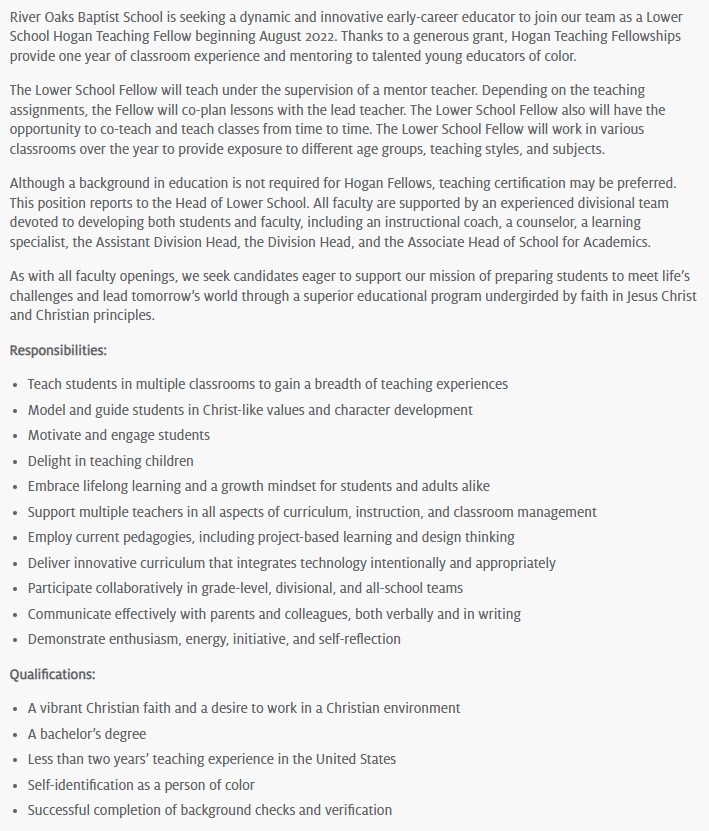
The school has summaries of the curricula for classes up to the eighth grade. In the “Global Citizens” class for fourth graders, the school states that students will have “thought-provoking discussions about bias and perspective [that] will help your child see how history is shaped and by whom.” The school continues to explain about the class:
For example, your child will form his own opinion about what really happened during the Boston Massacre by reading newspaper stories and firsthand accounts from both England and Massachusetts. The theme of migration picks up with our study of westward expansion. When settlers crossed the Mississippi and the Rocky Mountains, what did they gain—and at whose expense?

The fifth grade “Global Citizens” class appears to teach students to question major events in American history, including the Mexican American War. Students will be taught to consider the “bias” and “motive” of the history taught to Americans. The school states about the class:
In every unit, students will consider events from multiple perspectives, looking not only at the dominant narrative but also at lesser-known perspectives and stories. In the process, your child will learn to think critically about past events: Who is telling the story? What is their bias, purpose, and motive? Whose voice is missing? Applying this skill, your child will examine primary sources and conclude for herself whether the Mexican American War was justified.

For the description of the eighth grade “Global Citizens” class, the school appears to state political opinions of school leadership. The school states: “A presidential election. Racial unrest amidst a pandemic. The struggle for voting rights. A historian might be hard-pressed to tell whether headlines about these issues were written this year or a century ago. Understanding American history shapes our ability to be well-informed citizens.”
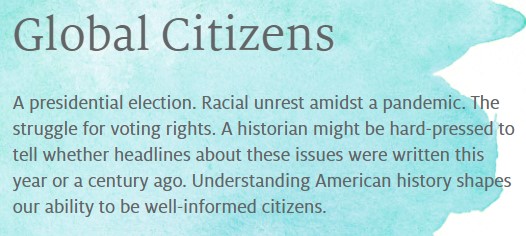
On May 22, 2019, Leanne Reynolds wrote a letter explaining that the school was already in the process of changing the curricula taught in classrooms to promote “inclusion.” She explained that “we are transitioning our curriculum coordinators into full-time instructional coaches in Preschool, Lower School, and Middle School.” She continued to explain:
They will work with teachers in the classroom to implement best practices in differentiated instruction. Our learning specialists—all of whom have advanced training in gifted and talented instruction as well as learning differences—will also enhance this strategic effort. Our focus on diversity and inclusion will be a natural progression of initiatives set in motion by Director of Community Initiatives Melanie Hightower. In classrooms, for example, we are adding more “windows and mirrors” books that allow all students to see a reflection of themselves (“mirrors” books) and gain insight into people whose lives are different from their own (“windows” books).
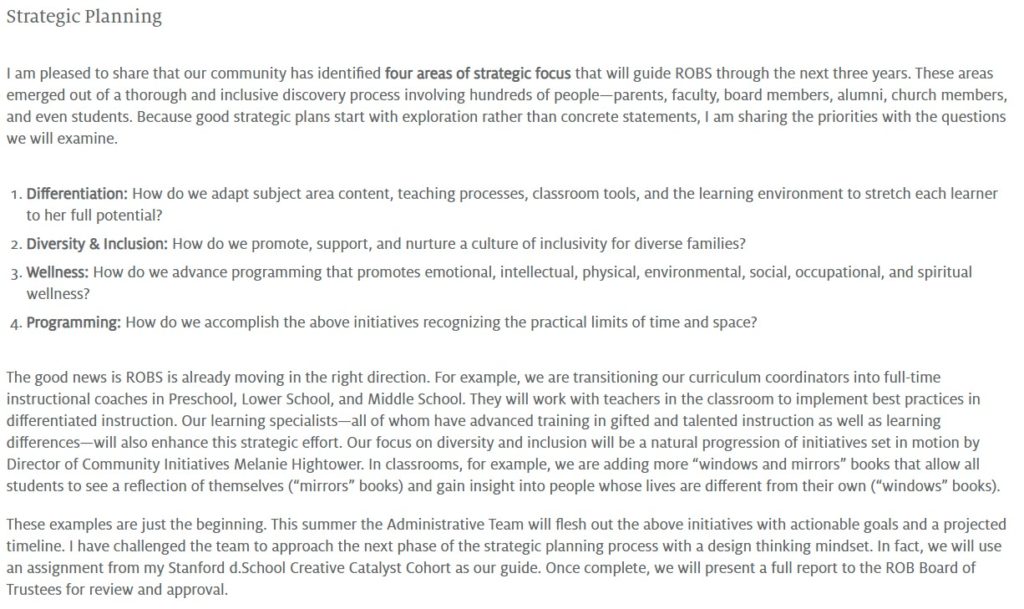
In another letter, Leanne Reynolds discussed “microaggressions.” She explained that she asked students: “Have you ever felt excluded at ROBS based on your race or ethnicity?” She added that “not one student said that they had ever felt excluded based on their race or ethnicity.” However, she then continued to explain that some students “said other students sometimes say things or do things that are unintentionally racist.” Leanne Reynolds described this as “microaggressions.” She then appeared to state that students do not want adults involved when this happens:
I’ve learned a lot about microaggressions over the last few months, and I know how hurtful they can be. Just as I was about to jump in, the students told me that the microaggressions they’ve experienced were not on purpose. The mean things are said by kids because they are kids. They said that unintentional unkindness occurs all the time but when it happens based on a child’s race or ethnicity, they felt that adults unnecessarily overreact.
She added that students often don’t speak up “when others hurt them” because “they know the adults in their lives will overreact.” She then said that students asked her the following questions: “They asked me why we don’t just serve as guides while the kids work things out themselves? Why don’t we help them understand why what was said was hurtful, and encourage the offender to own the mistake and apologize?”

The school also appears to implement political ideology into Black History Month lessons taught to students. The school openly teaches preschool students to focus on the color of their skin during Black History Month. The school had preschool students “select a food that most closely resembled the color of his or her skin.” The school explains online:
Our Preschool students began February with a literacy lesson that helped them take a close look at the beautiful skin tones that God gave each of us. The Colors of Us, by Karen Katz, helped our students see their skin in a new way. After reading the text, each child in the class was encouraged to select a food that most closely resembled the color of his or her skin. One picked coffee and another golden honey, while a third chose delicious vanilla ice cream. Just imagine the conversation your family might have at dinner tonight if everyone thought about skin color in this way!
During Black History Month, “fourth graders listened to and discussed ‘The Hill We Climb,’ the poem written and recited by 22-year old Amanda Gorman, the first National Youth Poet Laureate, at the inauguration of President Joe Biden.” The school also had seventh and eighth graders focus on “racial inequities.” The school states: “Students were asked to think critically about the progress we made as a nation through the Civil Rights Movement, while considering the racial inequities that persist.”
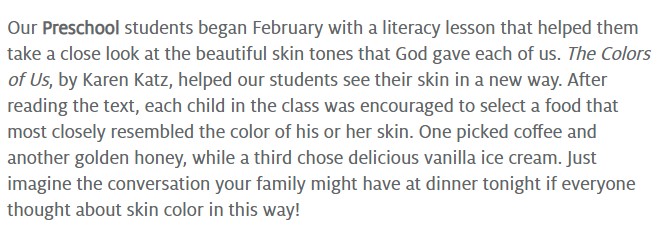

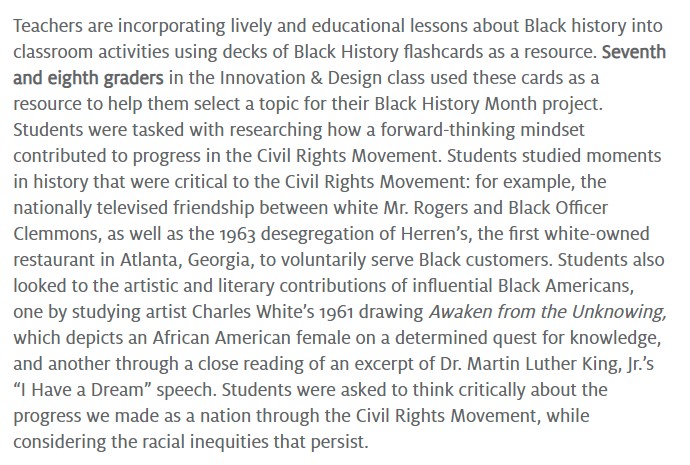
Breitbart reported that the school’s “previous director of diversity [Melanie Hightower] simultaneously worked at a crisis communications firm that specialized in dealing with ‘squeaky wheel’ parents who are ’emboldened to speak their minds.'” The news outlet reported that she worked as “both the director of human resources and the director of diversity/community initiatives at the same time.” Breitbart continued to report:
While advancing the diversity agenda at ROBS, Hightower began working as a crisis management consultant for The Jane Group (TJG). TJG is a crisis management firm that specifically caters to independent schools who need paid assistance in crisis communications and media management. The organization’s website advertises that they “know crisis,” “know communications,” and “know DEI.”
Breitbart reported that the group posted on social media: “There have always been a few ‘squeaky wheel’ parents. The difference today is that ‘misbehaving’ parents with an agenda to push can now go on Instagram and Twitter instead of speaking directly with the school’s administration – or if they don’t like the school’s initial response.” The news outlet also reported that the organization complained about “parent activism” in another post.


The news outlet continued to report that the school “consults TJG for crisis communications and is listed on TJG’s National Client List.” Breitbart stated that “when faced with their own crisis in the form of parent concerns regarding CRT, ROBS Head Leanne Reynolds sent out an email to teachers referring to parent’s concerns as ‘distractions.'” She even reportedly listed the names of concerned parents in an email to teachers.
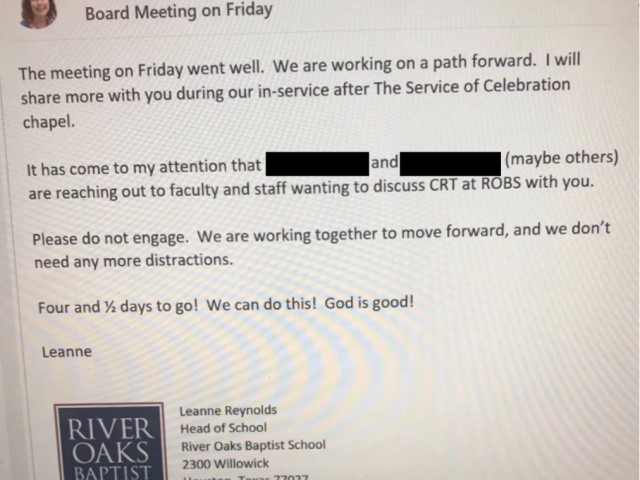
When Melanie Hightower still worked at the school, she reportedly encouraged school staff “to attend an online training focused on microaggressions, also linking to multiple articles that discuss the topic,” according to Breitbart. The name of the online training was “Creating an Anti-Bias & Anti-Racist School/Classroom or Organization: Microaggressions and Microaffirmations.” Breitbart also reported that “the training was hosted by Pollyanna, a pro-critical race theory organization that has crafted a ‘K-12 Racial Literacy Curriculum.'”

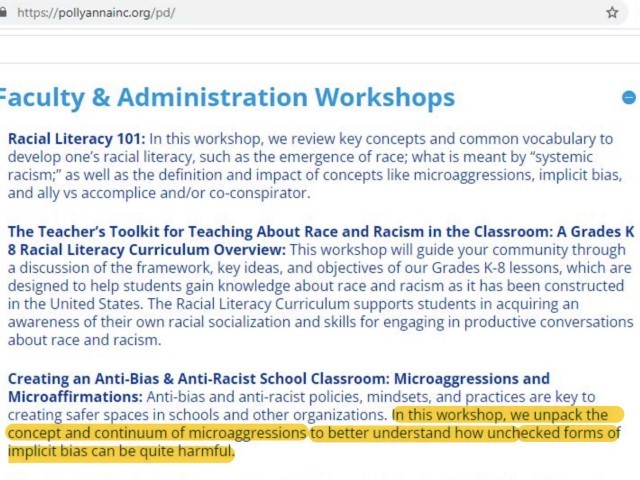
Stay Informed
